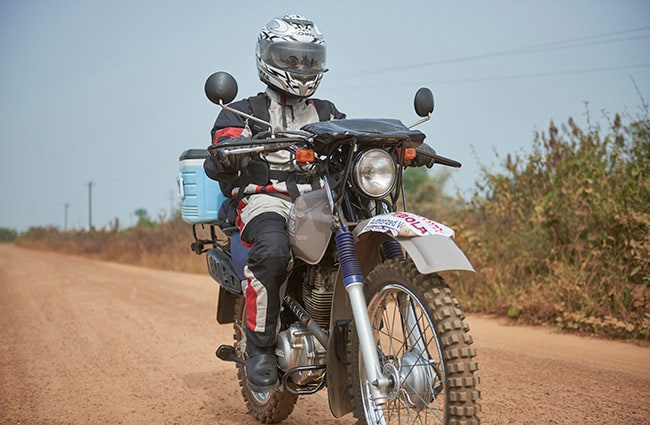Motorcycles Help Speed Diagnosis in Liberia
February 28, 2018

A motorcycle courier delivers laboratory samples over rough roads in Liberia.
Public Health Threat:
When infectious diseases strike, getting a fast and accurate laboratory diagnosis is critical to stopping an outbreak from becoming a widespread epidemic. Before the West Africa Ebola epidemic, Liberia had no system in place for getting clinical samples from remote areas to diagnostic labs – a journey that could take as many as eight hours on public transportation or over difficult terrain.
In remote areas, transporting samples from local healthcare facilities to diagnostic labs can be a risky process. Sending sick patients to faraway labs risks passing disease to others along the way. Using healthcare workers to transport samples can leave local clinics short-staffed for long periods. Delays in getting an accurate laboratory diagnosis can lead to improper precautions or incorrect treatment – all of which give opportunities for outbreaks to spread.
Response:
Motorcycle couriers offered Liberia an innovative solution for safely getting samples from local clinics to diagnostic labs. Riders for Health has trained a fleet of couriers who crisscross the country to transport samples between local health facilities and laboratories, allowing lifesaving results to be obtained and used faster by healthcare workers. The program operates with support from CDC Foundation, the U.S. Agency for International Development, the World Health Organization, and CDC.
Riders are trained in infection prevention and control and in motorcycle safety and maintenance. Because of the long distances between health facilities and laboratories, the program uses a relay system of collecting and batching samples and handing them off between riders, who ensure that samples are safely handled and kept in conditions that help preserve the samples for testing.
Impact:
CDC’s post-Ebola global health security work is enabling better public health response in Liberia. As of September 2017, more than 50,000 samples have been transported by Riders for Health over a total of more than three million kilometers. Before Riders for Health, only 25% of samples in Liberia reached a laboratory within 24 hours. Today, that number has increased to about 80%.
With the help of Riders for Health, 90% of specimens from all of Liberia’s 15 counties are now transported to laboratories by motorcycle. After laboratory analysis is conducted, results are promptly dispatched from the laboratories to the referring health facility through email or by mobile phone. The service enables rapid diagnosis and prompt medical intervention.
This program is operated and managed by Riders for Health for the Ministry of Health in collaboration with, and in integration with, the Liberian public health system. CDC’s Division of Global Health Protection (DGHP) is strengthening laboratory diagnostics in Liberia through the development and implementation of a robust, rapid, flexible specimen transport system that can be fully integrated into Liberia’s public health system as a model for long-term success.